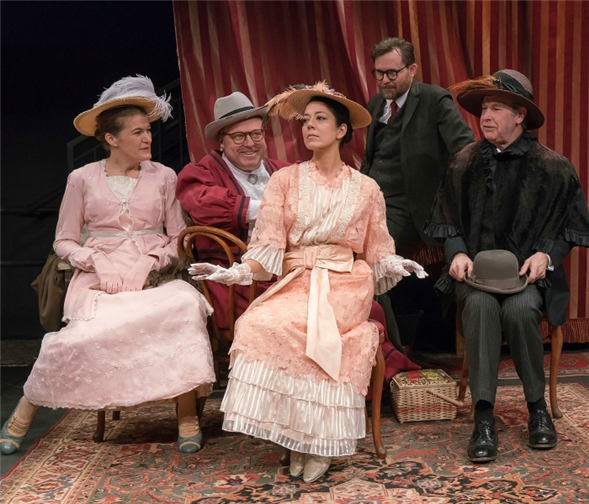Translate Page

Bedlam tackles Shaw's classic downtown while the musical plays on Broadway
---
Eric Tucker, the director and star of Bedlam's stripped-down take on Pygmalion, isn't concerned that Lincoln Center Theater is simultaneously mounting a lavish revival of the musical based on George Bernard Shaw's play. In fact, he welcomes it. "It's a great thing for people to go and see My Fair Lady in a big Broadway house and then come to the Sheen Center to see basically the same text without the songs," he says. "They both have the same themes, characters, and many of the same words, but they show how different interpretations can be with classics."
Reimagining classics is a hallmark of Bedlam, a six-year-old, New York-based theatre company known for its inventive, minimalist productions (Sense & Sensibility, Peter Pan, Saint Joan). Pygmalion certainly feels like a Bedlam show with a cast of six performing all the roles and even occasionally mingling with the audience. But those who know the story of Professor Henry Higgins (Tucker) molding impoverished Cockney flower girl Eliza Doolittle into a lady only from the musical may be surprised by the source material. As Tucker points out, the Higgins of My Fair Lady is much more sexist than the one in Pygmalion.
"I think the songs hold an extra layer of misogyny -- some of them are brutal," Tucker says, noting that "A Hymn to Him" contains the lyrics: "Women are irrational, that's all there is to that! Their heads are full of cotton, hay, and rags! They're nothing but exasperating, irritating, vacillating, calculating, agitating, maddening, and infuriating hags." In contrast, Higgins in Pygmalion is just "stating a case for why he is a confirmed bachelor," explains Tucker. "He even says, 'I find that the moment I let myself make friends with a woman, I become selfish and tyrannical.' He knows himself and that maybe he's not cut out for that type of relationship."
{Image1}
Of course the implied romance in My Fair Lady isn't in Shaw's original text either. "Most people think Higgins and Eliza get together in the end and that's because of the influence of the musical," Tucker says. However, he decided to use that misconception to toy with audience expectations. "We've pushed the boundaries a little in terms of, are they going to kiss? But they don't end up together," he says. "And it's a great surprise for people if they don't know the piece."
While that more feminist ending is authentic to Shaw, using performers of Indian descent as Eliza (Vaishnavi Sharma) and her father (Rajesh Bose) has added a layer of British colonialism to the play. Tucker admits that was a happy accident. "I asked Vaishnavi to do the show because I think she's a great actor and this is a perfect role for her," he says. "Once she said yes, then we started having conversations about how does Eliza being an Indian woman affect the play?" With many references to India already in the script (Higgins' pal Colonel Pickering mentions being stationed there and the professor discusses the country's various dialects), the casting makes Shaw's critique of British class, gender, and language seem even more biting.
But it's Pygmalion's insightful examination of Higgins' dysfunctional relationships with women -- Eliza, his mother, his housekeeper -- that make this 1912 play resonate so strongly today. "He can sort of ignore them but then expects them to take care of him," Tucker says. "His housekeeper can get away with saying the things she does to him because he can't do without her. It's like the relationship that he has with his mother. He responds to a woman who is strong. In fact, he is not really turned on to Eliza until the end when she is speaking to him almost in the way his mother does. Clearly, the man has mother issues."
---
Frank Rizzo is a theatre journalist who writes for Variety, American Theatre, The New York Times, The Hartford Courant, Connecticut magazine, and others. Follow him at @ShowRiz. Follow TDF at @TDFNYC.
Top image: Annabel Capper, Edmund Lewis, Vaishnavi Sharma, Eric Tucker, and Nigel Gore in Bedlam's Pygmalion. Photos by Ashley Garrett.
TDF MEMBERS: Go here to browse our latest discounts for dance, theatre, and concerts.